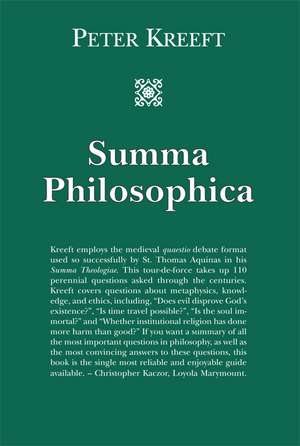Summa Philosophica
Autor Peter Kreeften Limba Engleză Hardback – 9 iun 2012
Preț: 158.34 lei
Preț vechi: 186.75 lei
-15% Nou
Puncte Express: 238
Preț estimativ în valută:
30.30€ • 31.72$ • 25.07£
30.30€ • 31.72$ • 25.07£
Carte indisponibilă temporar
Doresc să fiu notificat când acest titlu va fi disponibil:
Se trimite...
Preluare comenzi: 021 569.72.76
Specificații
ISBN-13: 9781587318252
ISBN-10: 1587318253
Pagini: 296
Dimensiuni: 169 x 233 x 27 mm
Greutate: 0.56 kg
Ediția:1st Edition
Editura: University of Chicago Press
ISBN-10: 1587318253
Pagini: 296
Dimensiuni: 169 x 233 x 27 mm
Greutate: 0.56 kg
Ediția:1st Edition
Editura: University of Chicago Press
Notă biografică
Peter Kreeft likes to argue. He has been Professor of Philosophy at Boston College for over 45 years, and has written over 60 books in philosophy and theology, including Socratic Logic, the only complete Aristotelian (common-sense, ordinary-language) logic textbook in print; Summa of the Summa and A Shorter Summa on St. Thomas’s Summa Theologiae; and many Socratic dialogues in which Socrates meets Jesus, Machiavelli, Marx, Sartre, Descartes, Hume, and Kant. All of them can be understood by non-philosophers as well as philosophers; that is why he is not a famous philosopher.
Cuprins
Introduction: why this book?
The Ten Divisions of Philosophy:
I. Logic and methodology
II. Metaphysics
III. Natural Theology
IV. Cosmology
V. Philosophical Anthroplogy
VI. Epistemology
VII. General Ethics
VIII. Applied Ethics
IX. Political Philosophy
X. Aesthetics
Addenda: Ten Extensions of Philosophy
Textul de pe ultima copertă
Peter Kreeft has finally produced his own Summa. His admirers have been waiting for it for years without quite knowing what they were waiting for. Kreeft asks all the basic questions. He answers them, an even greater feat. Nothing is more needed in our academic world than a systematic working through of all the most important questions – both the ones we ask and the ones we should ask. Not only are the questions here but also the most sensible answers. No one else could do this welcome intellectual service quite so well or with quite so much wit and wisdom. The “reason” of the faith shines nowhere more clearly or more persuasively than in the work of Peter Kreeft. With this book, we have his finest gift to us, an account of the intelligibility of things, one that both makes sense and makes us aware of the vast wisdom that lies in the human mind and in the revelation addressed to it. – James V. Schall, s.j., Georgetown University
First, Peter Kreeft imitated the Socratic dialogue form to put Socrates in conversation with Jesus, Hume, Descartes, Kant, and Machiavelli. Now, in Summa Philosophica, Kreeft employs the medieval quaestio debate format used so successfully by St. Thomas Aquinas in his Summa Theologiae. This tour-de-force takes up 110 perennial questions asked through the centuries. Kreeft covers questions about metaphysics, knowledge, and ethics, including, “Does evil disprove God’s existence?”, “Is time travel possible?”, “Is the soul immortal?” and “Whether institutional religion has done more harm than good?” If you want a summary of all the most important questions in philosophy, as well as the most convincing answers to these questions, this book is the single most reliable and enjoyable guide available. – Christopher Kaczor, Loyola Marymount, is author of How to Stay Catholic in College and The Ethics of Abortion.
First, Peter Kreeft imitated the Socratic dialogue form to put Socrates in conversation with Jesus, Hume, Descartes, Kant, and Machiavelli. Now, in Summa Philosophica, Kreeft employs the medieval quaestio debate format used so successfully by St. Thomas Aquinas in his Summa Theologiae. This tour-de-force takes up 110 perennial questions asked through the centuries. Kreeft covers questions about metaphysics, knowledge, and ethics, including, “Does evil disprove God’s existence?”, “Is time travel possible?”, “Is the soul immortal?” and “Whether institutional religion has done more harm than good?” If you want a summary of all the most important questions in philosophy, as well as the most convincing answers to these questions, this book is the single most reliable and enjoyable guide available. – Christopher Kaczor, Loyola Marymount, is author of How to Stay Catholic in College and The Ethics of Abortion.
